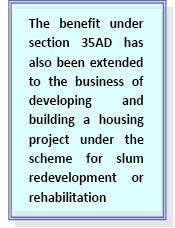|
||||||||||||||||
| Modifications to the Finance Bill, 2010 | ||||||||||||||||
|
||||||||||||||||
It is pertinent to note that section 35AD only provides for an accelerated depreciation in respect of capital expenditure. It is likely that section 80-IB(11C) may work out to be more beneficial because of the following reasons:
2. Housing projects The benefit under section 35AD has also been extended to the business of developing and building a housing project under the scheme for slum redevelopment or rehabilitation framed by the Central Government or State Government, as the case may be, which is notified by the Central Board of Direct Taxes. 3. Limited Liability Partnership The Finance Bill, 2010 had clarified certain aspects regarding conversion of a company into an LLP. It provided that any transfer of assets by a private company or an unlisted public company pursuant to its conversion into a Limited Liability Partnership (‘LLP’) will not attract capital gains, subject to certain conditions. However, the Bill did not clarify whether the transfer of shares of the company on its conversion to LLP will be subject to tax in the hands of the shareholder. It is now provided that such a transfer will not attract capital gains, subject to the same conditions as are applicable for transfer of assets by the company to the LLP. Where the specified conditions are not complied with, the capital gains exempted earlier shall be chargeable to tax in the hands of the shareholder. Further, where a person acquires the rights of a partner of an LLP by virtue of conversion of a private company or an unlisted public company into an LLP, the cost of acquisition of such rights shall be equal to the cost of acquisition of the shares held by him in the transferee company. 4. Modification in the limit of gratuity The Parliament has recently passed the Payment of Gratuity (Amendment) Act, 2010 to enhance the maximum amount of gratuity that can be paid under the Payment of gratuity Act, 1972. Prior to this enactment, the maximum gratuity that could be paid to the employees covered under the Payment of Gratuity Act, 1972 was restricted to Rs. 3.5 lacs. This limit of Rs. 3.5 lacs has now been raised to Rs. 10 lacs. With this amendment, the employees in the private sector have been brought on par with Government employees who were granted hike by the Sixth Pay Commission. It is pertinent to note that the above amendment applies only for those employees who are covered under the Payment of Gratuity Act, 1972. The employees who are not covered under the said Act will continue to enjoy the existing lower limit of Rs. 3.5 lacs. It is possible that the Government may issue a Notification in the Official Gazette enhancing the limit to Rs. 10 lacs for such employees. Also, the increased limit would result in a drastic increase in the amount of provision for gratuity to be made in the books of account of the assessee. This increased provision will be allowed as a tax deductible expense only to the extent of the contribution made by the assessee to an approved gratuity fund or to the extent the gratuity actually becomes payable to the employees. The exemption provided in the Income‐tax Act in respect of gratuity received as per the Payment of Gratuity Act also gets automatically enhanced to Rs. 10 lacs. |
||||||||||||||||
|
||||||||||||||||


 It is pertinent to note that section 80-IB(11C) still exists and hence an assessee has an option to claim benefit either under section 35AD or section 80-IB(11C). The benefit under both the sections cannot be claimed simultaneously. Moreover, once the benefit under section 35AD is availed, the assessee cannot thereafter claim the benefit under section 80-IB(11C).
It is pertinent to note that section 80-IB(11C) still exists and hence an assessee has an option to claim benefit either under section 35AD or section 80-IB(11C). The benefit under both the sections cannot be claimed simultaneously. Moreover, once the benefit under section 35AD is availed, the assessee cannot thereafter claim the benefit under section 80-IB(11C).